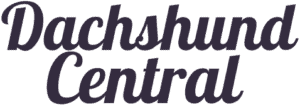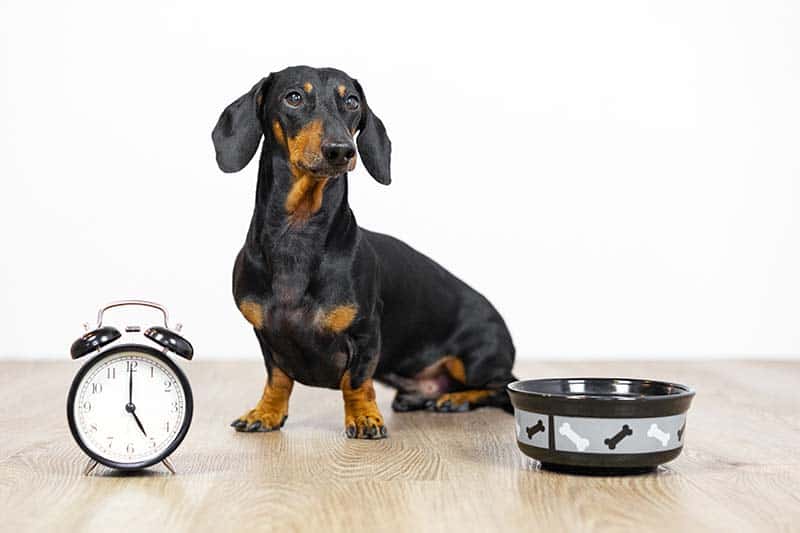
- Dachshund diet and exercise guide
- What do Dachshunds Eat?
- How much to feed a dachshund?
- What is the best diet for dachshunds?
- How many calories should a dachshund eat a day?
- What human food CAN dachshunds eat?
- What fruits and vegetables CAN dachshunds eat?
- What should I NOT feed my dachshund?
- What kind of exercise do dachshunds need?
- Final thoughts
Dachshund diet and exercise guide
Dachshunds are popular dogs, but they can be a challenge to take care of. They need plenty of exercise and a diet that is high in protein. This guide will help you make sure your dachshund gets the right food and exercise to stay healthy and happy.
What do Dachshunds Eat?
As a dachshund owner, you know that your furry friend has unique dietary needs. But with so many different types of dog food on the market, it can be hard to figure out what to feed your dachshund. This guide will help you choose the best food for your dachshund, based on their age, activity level, and health needs. With the right diet, your dachshund will stay happy and healthy for years to come!
Dachshunds have big appetites and always seem to be hungry. For this reason, dachshunds are susceptible to becoming overweight which can lead to serious general health problems as well as specific problems like painful and crippling back issues, becoming arthritic, and developing diabetes.
How much to feed a dachshund?
Adult dachshunds should only eat 2 times a day, and depending on their size should eat around 1 to 1 ¾ cups of food a day. While miniature dachshunds should eat between ¾ of a cup to 1 cup of food a day.
Dachshunds can be a bit tricky to feed, because even though they are a small breed, they pack a lot of energy so you need to give them enough nutrients and calories to satisfy their needs, but also be careful to not overfeed them because they are also prone to obesity. You should ask your vet for advice on how much to feed your dachshund.
How much food should a dachshund puppy eat?
Generally, a dachshund puppy will be eating around 1 oz of food per pound of body weight in a day, spread over 3-4 meals a day.
How many cups of food should a dachshund eat?
Miniature dachshunds
- If your dachshund weighs 10 pounds: 3/4 of a cup per day
- If Your dachshund weighs 15 pounds: 1 cup per day
Standard Dachshunds
- If Your dachshund weighs 20 pounds: 1 and 2/3 cups per day
- If Your dachshund weighs 30 pounds: 1 and 3/4 cups per day
Related post: Dachshund Feeding Chart: What You Need to Know
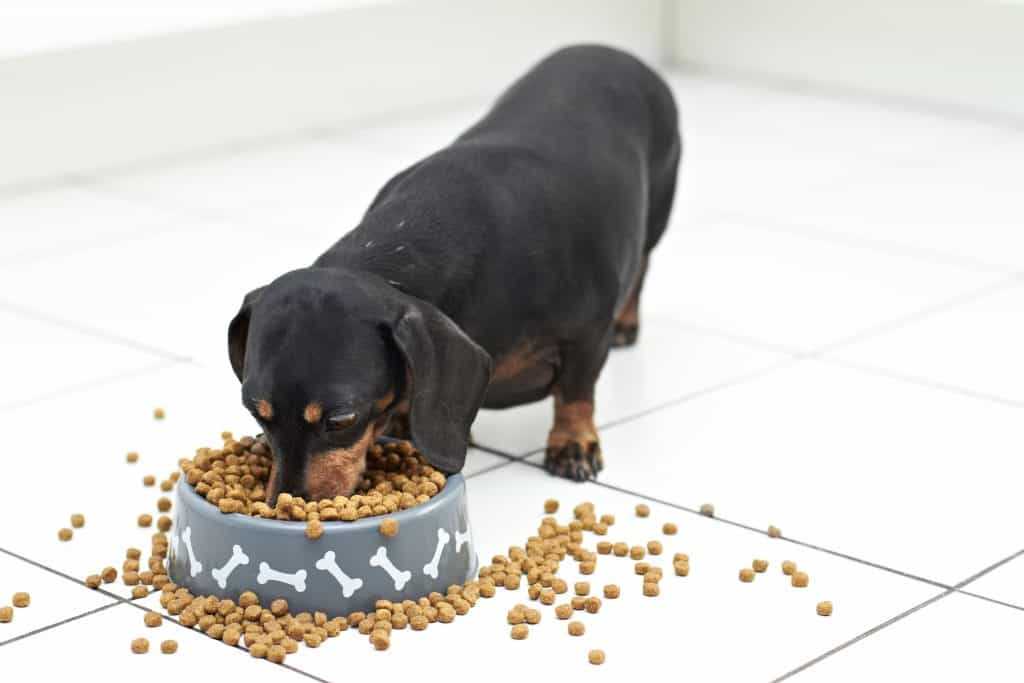
What is the best diet for dachshunds?
Dachshunds are carnivores, so they need protein-dense sources of food to provide them with the most important elements of balanced canine nutrition: proteins and fat.
Protein provides building blocks for healthy muscle while fats provide concentrated energy that is easy on the digestive system; both nutrients keep a dog happy by preventing them from getting hungry or irritable during vigorous exercise. Dogs also need certain vitamins and minerals but in much smaller amounts than humans do.
The Association of American Feed Control Officials (AAFCO) has specific guidelines for dogs’ nutritional requirements. They recommend a minimum of 22% protein for puppies and lactating females and 18% protein for adults. While the minimum fat requirement is 8% for puppies and 5% for adult dogs. (here is the link if you want to read more) So the best diet for dachshunds will have to follow these recommendations, while also providing the right amount of vitamins and minerals to keep your dachshund well nourished.
Related post: Can dachshunds be vegan?
What is the best kind of dog food for a dachshund?
The quality of food your dachshund gets is very important for your dog’s health. Unfortunately, most processed foods do more harm than good over time. So, if you decide to buy kibble or processed wet food make sure to always check the ingredients list before buying.
The highlight and top ingredients should be animal protein like chicken, beef, lamb, or fish. Avoid brands that list meat by-products as ingredients, as this may consist of just slaughterhouse waste.
Also avoid food made with corn, cornmeal, or wheat as their top ingredients, as these ingredients are added as fillers and don’t contain much nutritional value.
The best food you can give your dachshund will always be natural food, homecooked, or dry kibble from a quality provider. Some may recommend raw food, but you need to be very careful when handling raw meat, Nevertheless, there are safe ways to include some raw meat in your dog’s diet, like freeze-dried or dehydrated raw food. Here is a post we wrote about feeding raw meat to your dachshund: Is Raw Food Good For Dachshunds?
There are so many choices out there when it comes to picking dog food. With this guide, you’ll be able to narrow down the options and choose a brand that’s right for your dog!
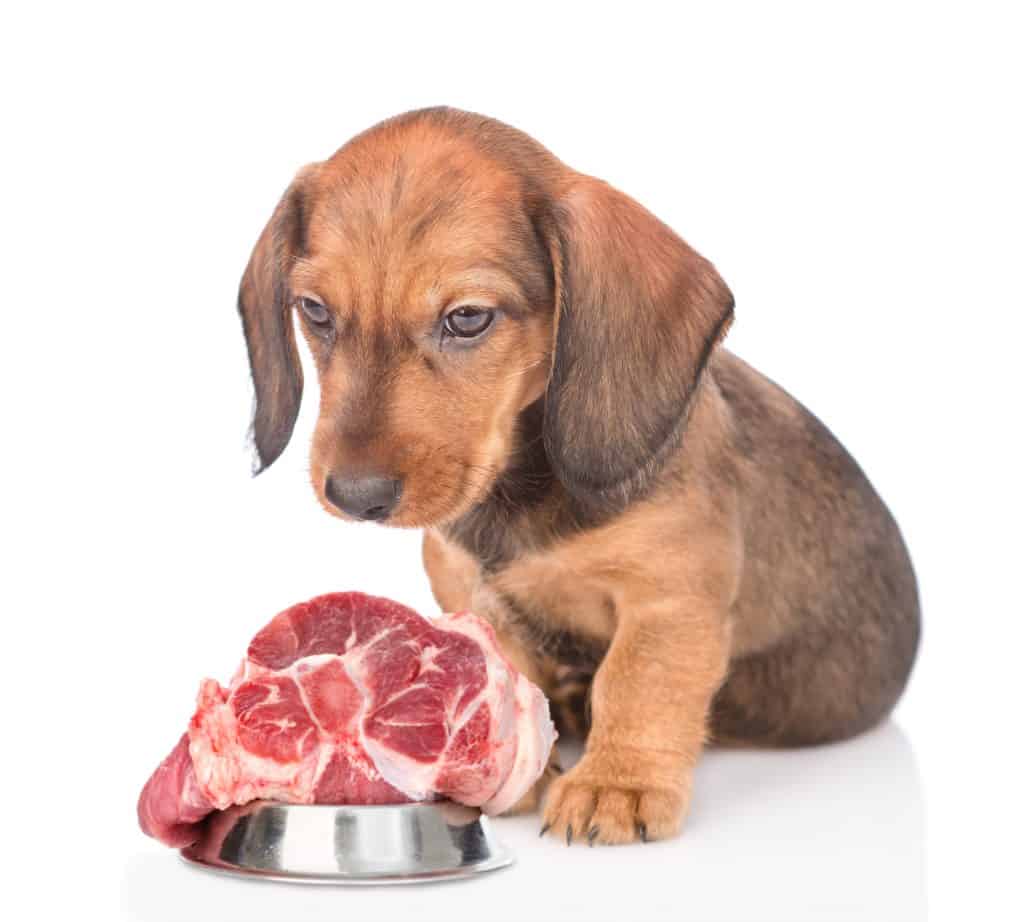
How many calories should a dachshund eat a day?
On average, dogs require about 30 calories per pound of body weight each day. However, small breeds like dachshunds may need up to 40 calories per pound each day depending on their activity level. Smaller dogs have a faster metabolism than larger breeds which means that they burn energy more quickly.
- An adult standard dachshund that weighs 32 pounds should eat 960 calories a day.
- An adult miniature dachshund that weighs 11 pounds should eat 330 calories a day.
Related post: Why won’t my dachshund lose weight?
Click here to find the best food for Dachshunds
What human food CAN dachshunds eat?
Humans and dogs are different animals. Dogs can’t digest the same way humans do, which is why it’s important to know what they’re allowed or not to eat. There are some fruits and vegetables that might be safe for us but aren’t healthy for our dachshunds.
These are the human foods that dachshunds CAN eat
Salmon: Salmon can make your dog’s diet healthier. Omega-3 fatty acids are a key ingredient in many top-quality dog foods, and they have been shown to support the immune system, decrease inflammation, and keep the coat looking shiny. Just be sure that the salmon is boneless, fish bones are dangerous for dogs.
Bread: Dogs can eat bread, but only in moderation. Plain white and wheat bread is usually safe for dogs to consume.
Oatmeal: Generally, oatmeal has been associated with several potential health benefits and is highly nutritious. You should avoid flavored varieties, as they could have added sugars and other ingredients that are dangerous for dogs.
Shelled Corn: Corn is a great source of carbohydrates for your dog, but make sure it’s given in moderation. Corn can be part of an overall balanced diet and many veterinarians agree that corn isn’t harmful to dogs at all! Just make sure they don’t eat the corn´s cob, it could cause gastrointestinal injury and obstructions in small dogs like dachshunds.
Peanut butter: Dogs can eat peanut butter as long as it is fed in moderation. It is best to choose unsalted peanut butter without added sweeteners. Also, make sure that the peanut butter you feed your dog does not contain xylitol. This ingredient is toxic for dogs.
Related post: Is Your Dachshund Overweight?
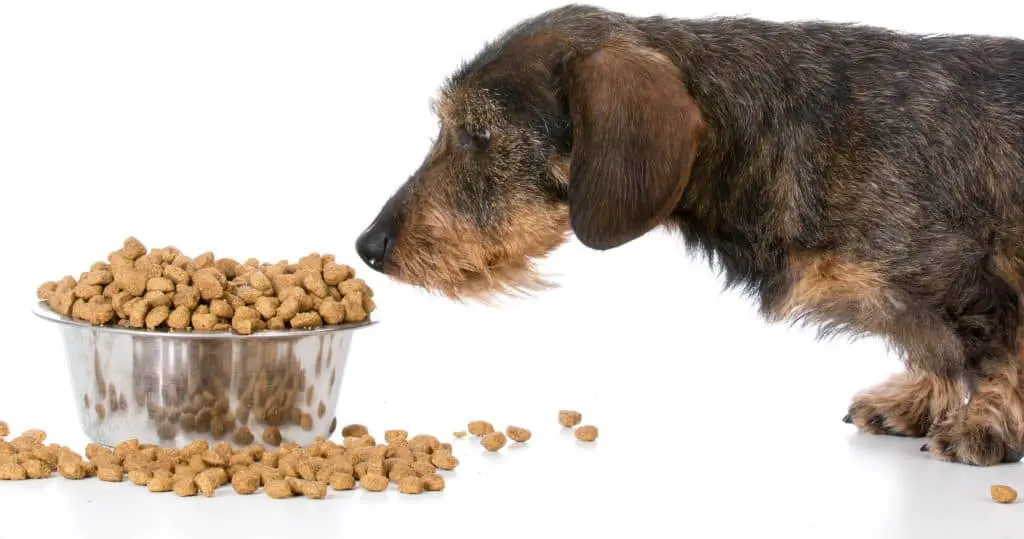
What fruits and vegetables CAN dachshunds eat?
Can Dachshunds eat apples?
Apples are a perfect snack for senior dogs! They’re low in protein and fat, making them easy on the stomach. Just make sure to remove the core and seeds before you feed your dachshund an apple, apple seeds can be harmful to dogs. Read more here
Can Dachshunds eat bananas?
Bananas can be given as an occasional treat for your dog. They’re high in potassium, vitamins, fiber, and, biotin which keeps their coats healthy while at the same time being low-calorie with no cholesterol or sodium content. The only thing you should watch out for is bananas’ sugar content; make sure they’re not part of your dachshund´s main diet because too much sugar could lead to obesity problems. Read more here
Other fruits and vegetables that dachshunds can eat
Blueberries: Blueberries are a superfood for dogs that can help prevent cell damage. Blueberries contain antioxidants and fiber. They also come with phytochemicals which give them an extra healthy boost!
Cantaloupe: When it comes to fruit, cantaloupe is one of the best choices for your dachshund. With a high water content and fiber that will keep them full with fewer calories, this juicy melon can offer tons of benefits as well as being low in sugar compared to other fruits. However, you should still be careful not to overindulge, especially if your dachshund is overweight or has diabetes!
Cranberries: Cranberries are safe for dogs to eat. Both fresh cranberries and dried ones count as treats when given in small quantities. Whether your dog likes it or not may vary but remember: moderation is important no matter what type of food you feed them.
Cucumbers: Dogs can eat cucumbers. Cucumbers are especially good for overweight dogs, as they hold little to no carbohydrates, or fat while also boosting their energy levels. They’re loaded with vitamins K, C, and B1 along with potassium, copper, magnesium, and biotin among other nutrients. For these reasons, cucumbers are a healthy snack alternative when your dachshund is feeling under the weather.
Mango Dogs can eat mangoes! This sweet summer treat is packed with four different vitamins: A, B6, C, and E. They also have potassium as well as both beta-carotene and alpha-carotene. Just remember to remove the hard pit first; not only does it contain small amounts of cyanide but it’s a choking hazard too! Mango has a lot of sugar so use it sparingly.
Oranges: Oranges can be a tasty treat for your dog but, depending on its personality, it may not enjoy the smell. Veterinarians recommend that you peel the oranges before giving them to your pet and that they eat only the juicy flesh minus any seeds if possible. Oranges are rich in vitamin C, potassium, and fiber which makes this fruit an excellent choice when feeding your dachshund!
Peaches: Dogs can enjoy peaches, but only if they are cut up. Fresh or frozen peach slices provide high levels of fiber and vitamin A which help fight infections in dogs. That being said, make sure you completely remove the pit first before feeding your pup any fresh peach treats as it contains cyanide that is harmful to them! You should also avoid canned fruit because most brands have added sugars, which will cause more harm than good for your dachshund´s diet.
Pears: Dogs can eat pears! Did you know that not only are they a great snack because they’re high in copper, vitamins C and K, and fiber? It has been suggested by many health professionals that eating this fruit can reduce the risk of having a stroke by 50%. Just be sure to cut them into bite-size chunks first. You should also remove their seeds which contain traces of cyanide.
Pineapple: Dogs can enjoy pineapple as a sweet snack, but only if the peel and crown are removed first. Pineapple contains many vitamins, minerals, and fiber that make it an excellent addition to a dog’s diet. Plus dogs love eating this fruit! The enzyme bromelain also helps with the absorption of proteins which makes this tropical treat safe for all canine friends.
Raspberries: Dogs can eat raspberries. Raspberries are great for dogs because they contain antioxidants and anti-inflammatory properties that can help their joints. They’re low in sugar, high in fiber, manganese, vitamin C and the list goes on! Dogs of all ages will benefit from eating these delicious berries as long as it is done in moderation to avoid unwanted side effects like diarrhea or constipation.
Strawberries: Strawberries are known to be one of the most delicious fruits around. Strawberries provide essential nutrients such as vitamin C and fiber that will help keep your dachshund happy and healthy all year round. They’re also great for your dog’s teeth! Strawberries help whiten the teeth thanks to an enzyme found in this fruit called malic acid. Dogs can have strawberries as a healthy snack, but don’t give them too many since they contain sugar.
Watermelon: Dogs can eat watermelon, but you should remove the rind and seeds first as they could cause an intestinal blockage. Watermelons are 92% water so it’s a way to keep them hydrated in hot temperatures! It contains vitamins A, B-6, and C with potassium. This fruit makes for a great summer snack.
Broccoli: Though broccoli is safe for dogs to eat in very small quantities, it’s best served as an occasional treat. It has high fiber and vitamin C content while being low-fat; but even then, Broccoli florets contain isothiocyanates which can cause mild gastric irritation in some dogs. Also, the stalks of the plant have been known to obstruct esophagus passage when eaten by dogs who chew aggressively or simply inhale their food.
Brussels Sprouts: Brussels sprouts are a popular vegetable for people and dogs alike! Brussels sprouts contain many nutrients that can be fantastic for both humans and our furry friends. But beware, too much of this veggie may cause your dog to produce gas which is very unpleasant (and smelly!)
Carrots: Dogs love to eat carrots and it’s a great way for them to get their daily dose of vitamin A. Carrots are also high in fiber, which is good for your pup’s digestive system. Also, crunching on carrots will help clean your dog’s teeth. This is great for dachshunds since they usually have problems with their teeth since they accumulate plaque easily.
Celery: If you’re looking for a way to make your dachshund´s breath smell amazing, celery is the perfect snack. Not only does it contain vitamins A and C and nutrients that help protect against heart disease and cancer, but this crunchy green vegetable will freshen their icky breath too!
Green beans: Dogs love green beans! They’re full of important vitamins and minerals, with a good dose of fiber. Dogs can eat them raw or cooked, all types are safe for dogs to eat as long they’re plain without salt added.
Peas: Dogs can eat all types of peas, either fresh or frozen. Peas offer many vitamins and minerals as well as protein. Avoid canned pea products because they usually have added sodium making them dangerous for dogs who do not need that much salt in their diet.
Spinach: Spinach is a powerhouse of beta-carotene, vitamins, and minerals, as well as being high in fiber. The greens also boast antioxidants to help keep your dog´s body healthy inside out!
Related post: Are dachshunds picky eaters?
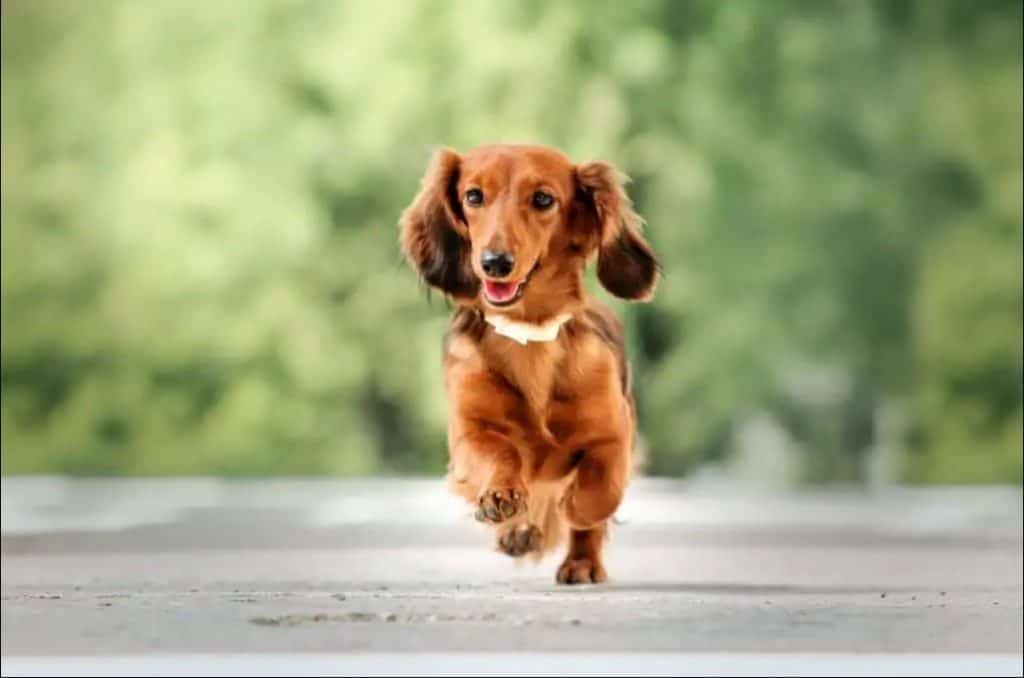
What should I NOT feed my dachshund?
Avocado: The avocado is a surprisingly dangerous fruit for dogs. Avocados contain persin which can cause vomiting or diarrhea in dogs.
Cherries Cherry plants, except for their fleshy outer layer around the seed pod, contain cyanide and are toxic to dogs. If your dog eats cherries you will need to be on the lookout for dilated pupils, difficulty breathing, or red gums as these could be signs that he has been poisoned by this plant’s toxin!
Grapes Grapes and raisins have been proven to be very toxic for dogs and can lead them to acute kidney failure if consumed in large quantities by a dog of any breed or gender. To avoid the risk of poisoning your dachshund, keep grapes off their menu!
Tomatoes: In general, dogs are safe around the ripened fruit of tomatoes. The exception is the green parts of plants that contain solanine. This substance will make your dog sick if they eat too much. Since any amount could potentially harm your dachshund, you might want to skip tomatoes. It’s not worth the risk!
Mushrooms: Washed white mushrooms from the supermarket can be safe for dogs, but it’s better to play it on the safe side. Dogs should avoid mushrooms, especially wild ones. While only 100 of the 50,000 mushroom species worldwide are known to be toxic and can really hurt your dog or even lead them to death; it’s better not to take any chances by skipping fungi altogether.
Onions: Dogs should never eat onions, leeks, chives, or garlic. These plants are part of the Allium family which are poisonous to most pets. Eating these vegetables can cause your dog’s red blood cells to rupture as well as vomiting, diarrhea, stomach pain, or nausea.
Chocolate: Chocolate is poisonous to dogs because of its theobromine content. Dogs can’t metabolize theobromine, causing them to start vomiting and having diarrhea. Even if they eat a small amount. But if your dachshund eats a large amount of chocolate, it may experience tremors and seizures, and also abnormal heart rhythm.
Fatty Meats: Giving your dachshund fatty meats, both cooked or uncooked, might be bad for your dog! Eating high amounts of fat could cause dogs to develop pancreatitis over time, which is extremely serious.
Salty foods: Dogs are susceptible to a disease called sodium ion poisoning, which can be caused by high-salt foods such as fatty meats like bacon and popcorn. Symptoms of this often include diarrhea or vomiting. In more serious cases, seizures may occur with tremors and even death.
Dairy Products: Some dogs are lactose intolerant. This means that their bodies can not handle dairy products properly, which can lead to nasty side effects like stomach pain and gas! But, even dogs that are lactose intolerant can enjoy a little bit of cheese now and then.
Sweets: Sugar is never good for a dog, especially in large quantities. And to make things worse, many of today’s sweets are made with sugar substitutes such as Xylitol which can cause seizures and death in dogs if ingested.
Well, we already know how to feed our dachshunds. Now we have to talk about the exercise that dachshunds need to stay healthy
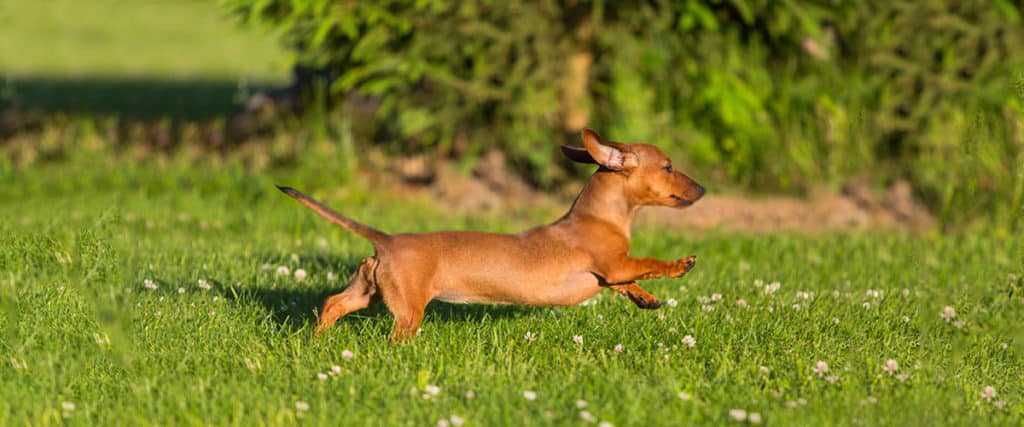
Check out this related post: How To Raise a Happy and Healthy Dachshund
What kind of exercise do dachshunds need?
Going for walks is the best way to exercise a dachshund. Going for a walk in the park keeps them mentally stimulated, as they take in new smells and sounds. In addition, they can socialize with other human dogs. Which is very important for dachshunds. Aside from walking, dachshunds can be exercised in other ways.
Related post: How to tire out a Dachshund
The best ways to exercise your dachshunds:
- Take your dachshund for a walk.
- Play fetch with your dachshund.
- Play hide and seek with your dachshund.
- If you have access to a pool, take your dachshunds for a swim.
- Enroll your dachshund in agility classes.
Related post: Can Dachshunds Swim?
Daily exercise is very important for dachshunds. Because dachshunds are a hunting breed, they are very energetic and need a daily dose of exercise. It’s important to exercise your Dachshund daily. If you don’t, they can become overweight or even obese.
Related post: How much should a dachshund weigh?
Unfortunately, many owners think that because of their small size, they get enough exercise in their house. Even worse some carry them around all day, and their little legs hardly touch the ground.
How much exercise does a dachshund need daily?
The average dachshund will need around 30 to 60 minutes of daily exercise to keep them fit, healthy, and mentally stimulated. They do have little legs so they don’t like to run very much or go for a jog. Instead, they prefer to walk at a more leisurely pace.
Related post: Are dachshunds a healthy breed?
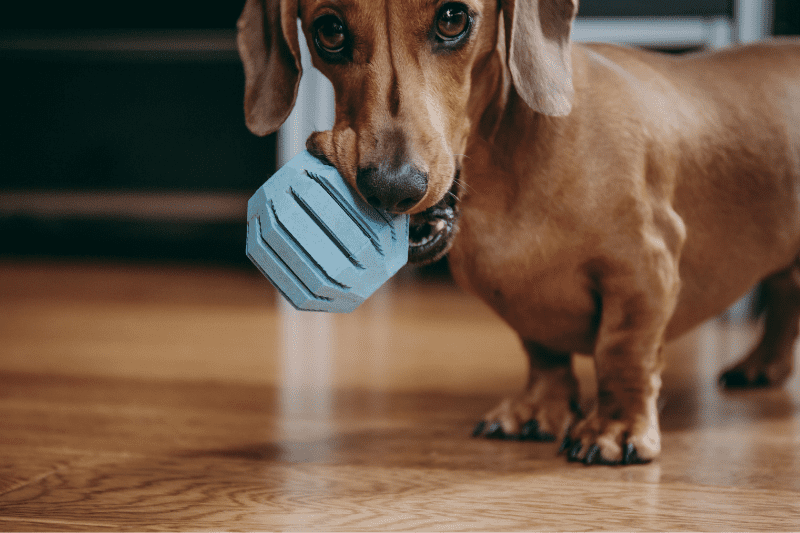
How much exercise does a Miniature Dachshund need
Miniature dachshunds can walk up to 5 miles in a day. Because of their small size, they have less energy than standard-sized dogs and therefore need less exercise to stay fit. For Miniature Dachshunds, 20 to 30 minutes of daily exercise is usually enough.
Related post: How far can dachshunds walk?
Final thoughts
So, what can dachshunds eat? As we’ve seen, there are a lot of human foods that dachshunds can enjoy. Just be sure to feed them in moderation and monitor their weight so they don’t become overweight. And remember, always consult your veterinarian if you have any questions about your dog’s diet. Thanks for following our dachshund feeding guide!
If you want to keep your dachshund happy and healthy make sure that they are well-fed and that they get enough exercise. The best way to do this is by feeding them a high-quality diet that ensures all of the nutrients they need for optimum health. We hope these tips help you understand what it takes to care for one of these delightful dogs so that they can live long, happy lives as members of your family!
If you want to find the best pet insurance for your dachshund click here
Recent Posts
Calculate the perfect food portions for your dachshund with our specialized calculator. Get customized feeding recommendations based on size, age, and activity level to support your wiener dog's back...
Looking for the perfect gift for a proud dachshund mom? We’ve rounded up the cutest dachshund shirts that celebrate your love for wiener dogs in style. Whether you’re shopping for yourself or a...
